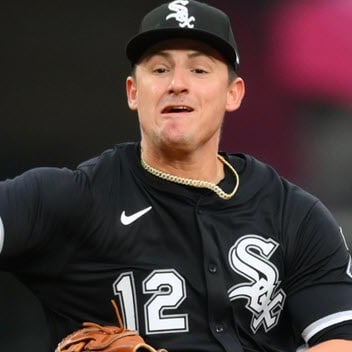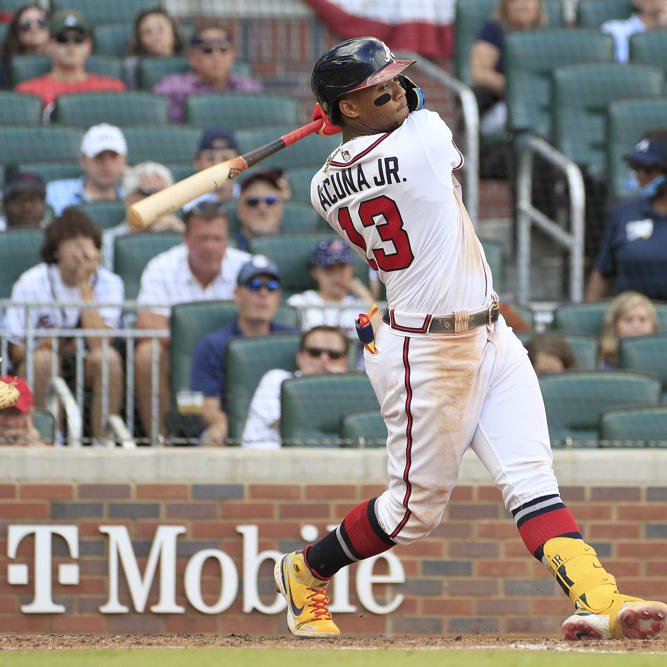Shortly after the conclusion of the World Series (congrats, Rangers), my homie Chris Crawford and I got together on the RotoWire Fantasy Baseball Podcast to discuss players who might have seen their stocks rise as a result of their postseason performance. You can check that out in audio form here, but I thought it would be worthwhile to write about some of those guys more in-depth, so that's what this piece will be exploring.
There's always some danger in trying to glean anything out of small samples, and the playoff samples qualify as relatively small. For example, Marcus Semien and Corey Seager led the way with 82 plate appearances among this year's postseason participants and only Nathan Eovaldi (36.2), Zac Gallen (33.2) and Jordan Montgomery (31) threw 30-plus innings.
While that's not a ton of data to go on, it's not nothing. Also, perhaps even more important than the numbers themselves is how a good showing in the playoffs can enhance an organization's outlook on a player, which can act as a springboard heading into 2024. Let's take a look at one guy who is trending up post-Fall Classic.
Pfaadt was among the game's most hyped pitching prospects ahead of his major-league debut in early May, and for good reason.
The 25-year-old had a stellar 2022 campaign, posting a 3.83 ERA, 1.16 WHIP and 218:33 K:BB over 167 innings covering 29 starts split between Double-A Amarilo and Triple-A Reno. Pfaadt's 218 punchouts led all of the minor
Shortly after the conclusion of the World Series (congrats, Rangers), my homie Chris Crawford and I got together on the RotoWire Fantasy Baseball Podcast to discuss players who might have seen their stocks rise as a result of their postseason performance. You can check that out in audio form here, but I thought it would be worthwhile to write about some of those guys more in-depth, so that's what this piece will be exploring.
There's always some danger in trying to glean anything out of small samples, and the playoff samples qualify as relatively small. For example, Marcus Semien and Corey Seager led the way with 82 plate appearances among this year's postseason participants and only Nathan Eovaldi (36.2), Zac Gallen (33.2) and Jordan Montgomery (31) threw 30-plus innings.
While that's not a ton of data to go on, it's not nothing. Also, perhaps even more important than the numbers themselves is how a good showing in the playoffs can enhance an organization's outlook on a player, which can act as a springboard heading into 2024. Let's take a look at one guy who is trending up post-Fall Classic.
Pfaadt was among the game's most hyped pitching prospects ahead of his major-league debut in early May, and for good reason.
The 25-year-old had a stellar 2022 campaign, posting a 3.83 ERA, 1.16 WHIP and 218:33 K:BB over 167 innings covering 29 starts split between Double-A Amarilo and Triple-A Reno. Pfaadt's 218 punchouts led all of the minor leagues, and he reached that number while sporting a miniscule 4.8 percent walk rate.
Pfaadt began the 2023 season back at Reno but was summoned to the big leagues after collecting a 3.91 ERA and 30:6 K:BB across his first 25.1 frames. In his major-league debut on May 3 versus the Rangers, Pfaadt was knocked around for seven runs on nine hits and a walk over 4.2 innings. He surrendered four home runs in the outing, which turned out to be a harbinger of doom.
The right-hander wound up making five starts for the Diamondbacks in May and finished with an 8.37 ERA, 1.65 WHIP and 18:8 K:BB. He permitted a whopping eight long balls in those five outings. It was at that point Arizona sent him back to the minors.
Although he came back up for one unsuccessful spot start in late June, Pfaadt returned to the majors for good in late July. It was at that point when he looked to settle in at the big-league level and show why he was so highly thought of as a prospect. In 13 second-half appearances (12 starts), Pfaadt put up a 4.22 ERA, 1.24 WHIP and 73:16 K:BB covering 70.1 innings.
Arizona handed the ball to the rookie right-hander five times during their surprise run to the National League pennant and in those five outings Pfaadt collected a 3.27 ERA, 1.09 WHIP and 26:5 K:BB over 22 innings of work. The highlight was NLCS Game 3 at Chase Field against the Phillies which saw Pfaadt strike out nine, walk no one and surrender just two hits over 5.2 scoreless frames. He induced 17 swinging strikes on just 70 pitches in the outing. Pfaadt then went out and produced 16 whiffs on 64 pitches in Game 7 versus the Phils.
Pfaadt is an extreme flyball pitcher whose home run issues have followed him since he entered pro ball. However, those problems with the gopher ball were at least getting better as the season went along. During Pfaadt's first six major-league starts when he really struggled, he had an ugly 3.2 HR/9 rate. In the second half that mark dropped to 1.7 HR/9. In the postseason it was down to 1.2 HR/9.
Coinciding with that drop in home run rate was Pfaadt utilizing his sinker more and his four-seamer less. In September he threw the sinker 19.4 percent of the time as compared to a 9.9 percent usage over the course of the season. His four-seamer came in at 40.6 percent in September as compared to 45.4 percent usage for the season.
Pfaadt's sinker actually had a higher whiff rate than the four-seamer for the season (18.8 percent to 17.5 percent). I'm not sure those rates would hold over the course of a full season at the big-league level, but I do think Pfaadt would gladly trade in a few more whiffs if leaning more on the two-seamer meant fewer home runs.
Another change Pfaadt made beginning at the start of his nice second-half run with the Diamondbacks was shifting his positioning on the rubber from the third-base side to the first-base side. The goal with the move, which was suggested by pitching coach Brent Strom and pitching consultant Perry Husband, was to make Pfaadt's pitches appear to be in the zone longer, making it more difficult for batters to lay off. The results speak for themselves.
Pfaadt's current NFBC ADP sits at 217, with a min pick of 152 and a max pick of 303. While the righty's ADP might have been 100 picks later if drafts were held prior to the postseason, I think anything after 200 still leaves room for plenty of profit, particularly if Pfaadt is able to keep the long ball to a digestible level.



































